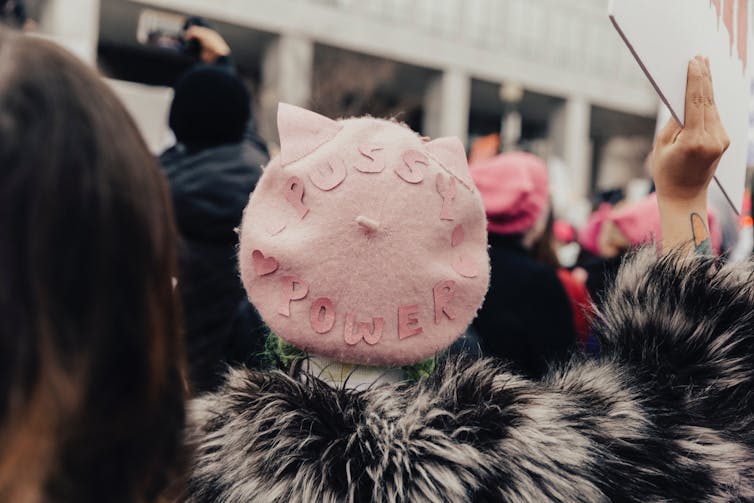The phrase “rape culture” elicits strong responses. Prominent among them are confusion, scoffs, anger and even anonymous vitriol from internet “haters.” When I posted on Facebook that I was seeking pro-feminist men to participate in a research project on rape culture, my co-investigator, Jacob Beaudrow, and I found ourselves to be on the receiving end of an email diatribe that included a death threat. That there was only one such email was a surprise.
The argument we make is that while women who have been raped endure the lasting effects of psychological and emotional harm, the problem of rape is not a “woman’s problem.” It is squarely a man’s problem. In the wake of recent horror stories about men in power who abuse women — like Harvey Weinstein — we offer some of our findings on rape culture and some suggestions for men to make change.
Predictably, naysayers will offer three main objections. One is: “But what about false accusations?” My response is: They happen. They are rare, but they happen. They should not be ignored, but neither should they distract us from the objective fact that assailants are overwhelmingly men and victims are overwhelmingly girls and women.
A second point is that men can get raped, too. That’s true. Some men are raped by other men and suffer emotional damage from stigma and a loss of identity as men. Some men have been forced to have sex with women, as legal scholar Siobhan Weare reports, but their experiences are belittled and go unrecognized in criminal codes and programs to assist and support victims of sexual assault. That needs to change.
A third objection might be that only “bad” men rape — the proverbial bad apple — and that most men are “good” men who do not rape. As Jacob and I have already argued, it is certainly the case that the majority of men do not rape women. So what, then, is the “culture” part of “rape culture?”
Consider the metaphor of thumbs and fingers. All thumbs are fingers but not all fingers are thumbs. Similarly, all rape is part of rape culture but rape culture is not limited to actual rape. In other words, rape culture encompasses a much broader range of behaviours, beliefs and norms than actual rape.
What is rape culture?
What we found from our conversations with 16 men who identify themselves as either feminist or pro-feminist was that while none of them were rape culture naysayers, most of them were not able to clearly identify what “rape culture” might mean or what it might look like when they see it.
The culture aspect includes gender norms that validate men as sexual pursuers and attitudes that view women as sexual conquests by which manhood is legitimized and women are objectified (“bros before hos”). It might mean media depictions of women as sexual objects to be owned or used or ways of communicating that minimize the effects of rape. Consider, for example, “I’m feeling rapey” T-shirts and comments among gamers such as, “I just raped you” instead of “I just beat you.”

Culture is a social script that we learn over time. It informally educates us about values, beliefs and behaviours that are broadly seen as “normal” or “common sense.” Examples of rape culture include jokes that minimize the effects of rape on women and pop music in which men tell women that “you know you want it.” It includes statements that decry the “tragedy” when the lives of college athletes who are convicted of rape are ruined. They include misrepresentations of rape as “20 minutes of action” or “just sex” and all manner of victim-blaming based upon what a woman wore or how much she drank.
Instead of teaching her how to avoid getting raped, perhaps more attention should be paid to teaching him how not to rape.
While all of the men we interviewed believe that rape culture is real, we noticed gaps in knowledge. One focused, for instance, on “the emotional issues that women have to work through … as well as their daily experiences from catcalling ….” Another pointed to the case of former CBC host Jian Ghomeshi, who was acquitted on charges of sexual assault, as an example of rape culture and victim-blaming in action. Still another pointed to Donald Trump as emblematic of the problem, particularly for his famous brag that he could grab any woman by the “pussy” as he pleased, without her consent.
Institutions feed rape culture
Little of the response from these men highlighted broader social and institutional factors that contribute to rape culture. One participant noted how the cliché “boys will be boys” validates a wide variety of behaviours, including sexual harassment. But he stopped short of connecting it to broader gender norms of masculinity that justify such behaviours in the first place.
What are called “homosocial” contexts, such as the male sports leagues and campus fraternities, tend to be places where rape culture can thrive. It is no accident, for instance, that women who serve in male dominated professions such as firefighting and the military may face ongoing sexual harassment.

Feminist writer Jessica Valenti notes that one in five women are sexually assaulted on campus. She writes: “Not all men who join frats (or varsity sports teams) are predators, [but] when so much sexual violence is centered around one area of campus life, something has to be done.”
Universities across Canada are in the process of drafting and implementing policies on sexual assault in the wake of human rights complaints filed by victims against their institutions. The universities of British Columbia, Victoria, Toronto, Dalhousie, Carleton and St. Mary’s are among them, but indications are that policies are ineffective and not followed properly. A nation-wide student group graded university policies across Canada, the average of which was C-.
Perhaps university policies on sexual assault might pay more attention to educating men as a key strategy to reduce sexual assault of women on campus. Re-learning gender norms, values and behaviours need not be perceived as a threat to manhood, as anonymous haters would suggest through online vitriol and misogyny.
Actively choosing to diminish rape culture
Culture does not determine our beliefs and behaviours; it only influences them. Men have choices beyond culturally prescribed norms of masculinity. As the 16 men who we interviewed collectively demonstrate, men can challenge their own values, beliefs and behaviours — and those of other men — when it comes to their sexual attitudes towards women, including in matters of consent.
Given the evidence of rape culture in everyday society, the outlook seems grim. The ray of hope that our research offers is that boys and men can be educated to be men of conscience, both informally and formally.
Working to mitigate the harms of rape culture is not about hating men. It is simply about taking responsibility for how we, as men, behave and act in the world. Harvey Weinstein, the most recent Hollywood power broker to fall from grace by a tide of sexual harassment and assault allegations, would have benefited from such an education. The women he targeted would have reaped the benefits too.

